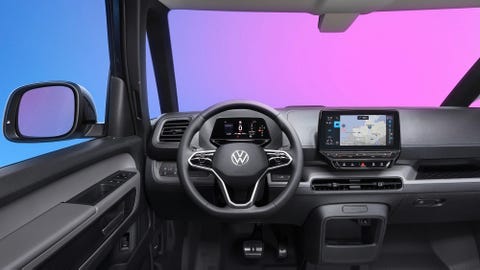- VW unveiled the ID.Buzz Cargo alongside the passenger version this week, with the panel van slated to be offered in Europe starting next year.
- The Cargo version was first previewed in 2018 with two concepts, as Wolfsburg mulled several versions of the base model.
- The panel van will offer 137.7 cubic feet of space inside, or enough for two Euro-size pallets, but it would face stiff competition from electric vans in the U.S.
The journey of the Volkswagen ID.Buzz from concept to production has not been short, and prospective U.S. buyers have to wait another two years to actually receive their retro-style MPV when it goes on sale in 2024. But with the official reveal of the model this week, Wolfsburg certainly delivered on an EV in a segment that is unlikely to be contested for quite some time.
Speaking of delivering, Volkswagen is also set to offer a panel-van version of the ID.Buzz that will land in a much more contested segment, one that has already seen a number of players. Unfortunately, the Cargo model is not slated to be offered stateside, and not just because of the chicken tax.
The ID.Buzz Cargo was first previewed in concept form at the IAA Commercial Vehicles show in Hannover, Germany, in 2018, showcasing the versatility of the MEB platform in a fairly compact package.
The panel van, featuring two rear barn doors and a single side door, was previewed with 48.0- and 111.0-kW batteries at the IAA, while also showing off a solar roof that was promised to add as much as 9.3 miles of range on a sunny day. Equipped with the larger of the two batteries, the cargo version was also promised with a top range of 340 miles in the WLTP cycle, with a single 201-hp motor out back doing the work.
With the release of the full specs of the civilian version of the ID.Buzz, it’s safe to say the cargo version was due for some revisions when it came to planned battery options, as the demand for a massive (and pricey) 111.0-kWh battery has proved to be too much of a good thing. Rather, VW indicated the Cargo version will be offered with an 82.0-kWh (77.0 kWh usable) battery as the top option, giving it a range of 310 miles in the WLTP cycle, which will be closer to 260 in the EPA cycle. The automaker presented the Cargo version in short-wheelbase form this week, but a long-wheelbase version is on the way as well, at least in Europe.
Volkswagen had already previewed a compelling contractor version of the ID.Buzz at the LA auto show in 2018, showcasing a storage and shelving system by specialist Sortimo, along with a 1760-pound payload capacity. Such a model was aimed at contractors that carry an extended supply of small parts and tools, rather than those who may need to transport something very heavy and bulky.
If the battery options might make the cargo version fairly compelling, other considerations have made the ID.Buzz Cargo moot for the U.S. market: size and a lack of body-style variants. The Cargo version is 185.5 inches long, which buys it enough room for two European-size pallets (which are smaller than U.S. pallets) with a total of 137.7 cubic feet of space inside. It would be adequate for some users, but it’s still in the category of boutique delivery vehicles rather than contractor vans.
For comparison, Ford has just started production and deliveries of the E-Transit, which is offered with a choice of three lengths and three roof heights in addition to chassis-cab and cutaway versions. All models use a 68.0-kWh battery, along with a single rear-mounted motor producing 266 horsepower and 317 pound-feet of torque.
The high-roof, extended-wheelbase version serves up 487.3 cubic feet of cargo space and a maximum payload of 3800 pounds. The sheer variety and size of the E-Transit, which began testing in fleets late last year, easily eclipses the varieties of the ID.Buzz that Volkswagen is expected to offer in Europe, with the Ford cargo van starting at $47,185 before incentives and destination charges.
Of course, Volkswagen could have made plans to offer the ID.Buzz Cargo in the U.S. market and would have found buyers, but the expected volume of sales would have likely been the deal breaker, along with the absence of a VW Commercial Vehicles sales arm here in the U.S.
So, as logical as the launch of the ID.Buzz Cargo versions may have seemed stateside at some point in time, VW was not in a position to replicate the variety of cargo models likely to be offered by other players, including BrightDrop. And perhaps Volkswagen learned something from Nissan, which last summer ended U.S. production of its NV Cargo, Passenger, and NV200 vans, due to slow sales.
VW would have certainly found some buyers, while still having to circumvent the chicken tax via disassembly and reassembly, but as a delivery or work vehicle it would have existed in a segment that’s perhaps too small to address with such an entry.
This content is created and maintained by a third party, and imported onto this page to help users provide their email addresses. You may be able to find more information about this and similar content at piano.io


